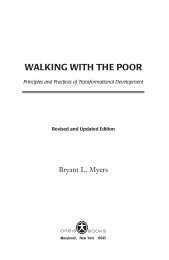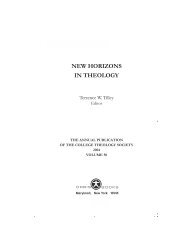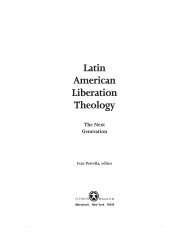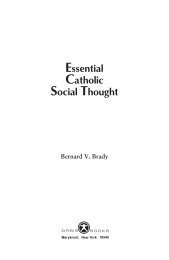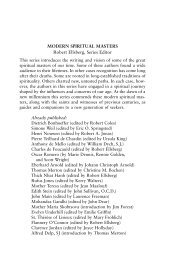CONCEPTS OF MISSION - Orbis Books
CONCEPTS OF MISSION - Orbis Books
CONCEPTS OF MISSION - Orbis Books
You also want an ePaper? Increase the reach of your titles
YUMPU automatically turns print PDFs into web optimized ePapers that Google loves.
Mission in Contemporary Missiology 15<br />
for a fervent cooperation in mission among the various confessions.<br />
Catholics, Orthodox, and Protestants are invited to question themselves and<br />
to share what they have understood and discovered in Christ according to<br />
their respective confessions. They must work together to proclaim Jesus<br />
Christ effectively in the world today and tomorrow. Collaboration already<br />
exists in several areas: social progress, religious education, theological<br />
research, etc. (Oborji 2002b, 27-30). Any reflection on mission trends today<br />
must include this renewed invitation to an ecumenical dialogue.<br />
In taking this direction, Vatican II intimately links the call to Christian<br />
unity to the church’s mission (AG 6). All baptized people are called upon to<br />
come together in one flock that they might bear unanimous witness to Christ<br />
their Lord before the nations. The Vatican II missionary decree goes on to<br />
say, “And if they cannot yet fully bear witness to one faith, they should at<br />
least be imbued with mutual respect and love” (AG 3, 19-23). And the council’s<br />
dogmatic constitution on the church states categorically that those “who<br />
are sealed by baptism which unites them to Christ . . . are indeed in some real<br />
way joined to us in the Holy Spirit” (LG 15). The Vatican II decree on ecumenism<br />
(Unitatis Redintegratio) also speaks in favor of improved relations<br />
and mutual acceptance. In general, Vatican II considers ecumenism as one of<br />
its principal concerns and states that division among Christians contradicts<br />
the will of Christ, scandalizes the world, and damages that most holy cause,<br />
the preaching of the gospel to every creature.<br />
This new development is also experienced in the Protestant churches. The<br />
formation of the World Council of Churches (WCC) in 1948 has been<br />
described as a great new fact leading toward Christian unity. Churches<br />
became aware that, today, it is impossible to say “church” without at the<br />
same time saying “mission”; by the same token it has become impossible to<br />
say “church” or “mission” without at the same time talking about the one<br />
mission of the one church. This is the new trend in mission (Bosch 1991, 464).<br />
There is a growing awareness of the relationship of the question of Christian<br />
unity and the unity of the human family. In fact, some have asked<br />
whether the unity of the human family is not somehow linked to visible unity<br />
among Christians joined in a single faith. There is also a strong view that<br />
stresses that the coming of the kingdom of God and the second coming of<br />
Christ must not be separated from this invitation for the unity of the human<br />
family. Mission aims toward the unification of all in Christ. For this to come<br />
about, missionary activities must also be directed toward building bridges<br />
across those things that divide diverse peoples: religious beliefs, ethnicity,<br />
race, ideologies, etc. As recent events and conflicts in the world are showing,<br />
the reign of God also means tolerance, reconciliation, peace, and justice. All<br />
this means that humanity is in dire need of ethnic and racial redemption<br />
(Mushete 1991, 152).<br />
Christian mission is rooted in the common faith that all Christians profess<br />
in Jesus Christ. The proclamation of this faith calls for communion if not




